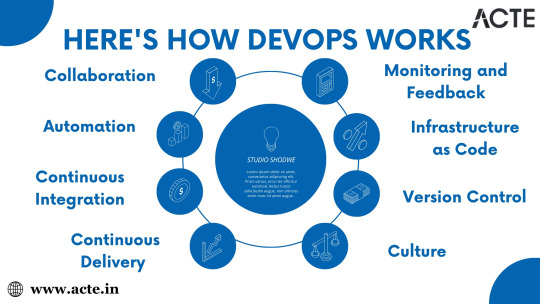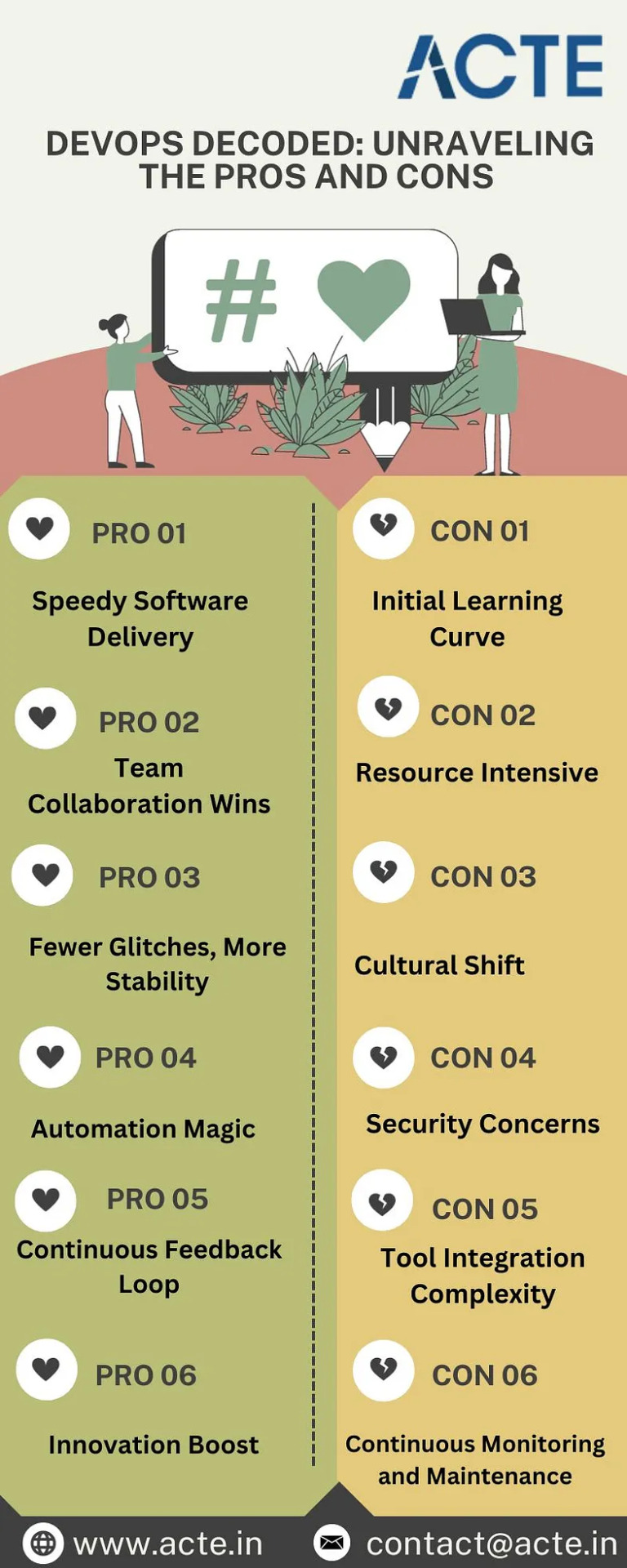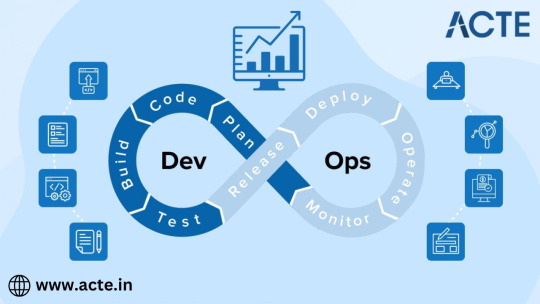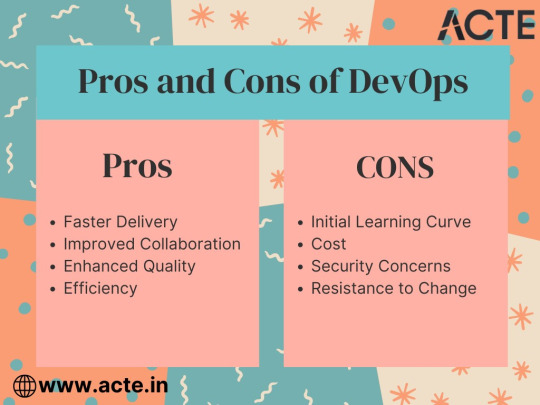#Devops training
Text
The DevOps Lifecycle: Building, Testing, and Deploying with Confidence
DevOps, a combination of "Development" and "Operations," has emerged as a game-changer in the software development landscape. It represents a comprehensive approach that fosters collaboration between development and operations teams, emphasizes automation, and cultivates a culture of continuous improvement. In this blog post, we will delve deeper into the world of DevOps, exploring its principles, practices, and how it works.

The Essence of DevOps:
DevOps is more than just a buzzword; it's a mindset that aims to break down silos and bridge the gap between traditionally isolated development and operations teams. At its core, DevOps promotes collaboration, automation, and a relentless focus on delivering high-quality software faster and more efficiently.
Collaboration: DevOps encourages close collaboration and communication between development and operations teams. By working together from the initial stages of a project, teams can align their goals, streamline processes, and reduce conflicts.
Automation: Automation is the backbone of DevOps. It involves using tools and scripts to automate repetitive tasks, such as code building, testing, and deployment. This not only speeds up development but also reduces the risk of human error.
The DevOps Lifecycle:
DevOps introduces a structured lifecycle that encompasses various stages, ensuring a seamless flow from code development to deployment and beyond.
Continuous Integration (CI): In this phase, developers frequently integrate their code into a shared repository. CI tools automatically build and test the code with every change, ensuring it remains functional and error-free.
Continuous Delivery (CD): Building on CI, CD automates the deployment process, allowing for the continuous delivery of tested code to production or staging environments. This enables rapid and reliable releases.
Monitoring and Feedback: DevOps teams continuously monitor applications and infrastructure in production. They collect feedback on system performance, user experience, and any issues that arise. This feedback loop is crucial for making improvements and responding to issues promptly.
Infrastructure as Code (IaC): IaC is a DevOps practice that involves managing infrastructure using code. It enables the automated provisioning, scaling, and configuration of infrastructure resources, ensuring consistency and reproducibility.
Version Control: Version control systems like Git are essential for tracking code changes, enabling collaboration, and ensuring code integrity.

The Cultural Shift:
DevOps isn't just about tools and processes; it's also about fostering a cultural shift within an organization.
Shared Responsibility: DevOps promotes a culture of shared responsibility, where both development and operations teams take ownership of the entire software delivery process. This reduces blame-shifting and encourages problem-solving.
Accountability: DevOps encourages accountability for code quality, security, and performance. Team members are responsible for the outcomes of their work, from development to deployment.
Trust and Collaboration: Open communication and trust between teams are essential. DevOps encourages cross-functional teams to work together, breaking down traditional barriers.
DevOps is not just a trend but a transformative approach to software development and deployment. Its principles of collaboration, automation, and cultural transformation are reshaping the industry. ACTE Technologies, through its training and consulting services, plays a pivotal role in preparing professionals and organizations for success in the DevOps-driven world. Embracing DevOps and partnering with ACTE Technologies can lead to faster, more reliable software delivery and a competitive edge in today's dynamic tech landscape. Start your DevOps journey today and reap the benefits of this revolutionary approach.
18 notes
·
View notes
Text
AWS DevOps Careers: Navigating the Cloud-Infused Professional Landscape
In the rapidly evolving tech terrain, the confluence of AWS and DevOps has given rise to a dynamic realm, promising an array of career prospects. This all-encompassing guide unveils the diverse roles and responsibilities within AWS DevOps, offering insights into the multifaceted career avenues that await proficient individuals.

1. Crafting Cloud Solutions: The Role of an AWS DevOps Engineer
Overview: AWS DevOps Engineers serve as architects of automated software development, leveraging AWS cloud services.
Responsibilities: Dive into Infrastructure as Code (IaC), fine-tune AWS tools, and champion the principles of Continuous Integration/Continuous Deployment (CI/CD).
2. Architecting Scalable Cloud Solutions: The Realm of Cloud Architects
Overview: Cloud Architects design scalable and reliable cloud infrastructure on AWS, seamlessly aligning with DevOps principles.
Responsibilities: Collaborate to optimize AWS services, ensuring a resilient and scalable cloud environment.
3. Reliability in the Cloud: The Role of a Site Reliability Engineer (SRE)
Overview: SREs focus on ensuring system reliability, availability, and performance on AWS through vigilant monitoring and automation.
Responsibilities: Implement automation strategies, monitor AWS resources, and respond adeptly to incidents.
4. DevOps Consultancy: Guiding Organizations to DevOps Excellence
Overview: DevOps Consultants provide expertise in implementing DevOps practices, specializing in AWS services.
Responsibilities: Offer guidance on best practices, implement CI/CD pipelines, and optimize workflows using AWS tools.

5. Embedding Security into DevOps: The Role of a Security DevOps Engineer (DevSecOps)
Overview: DevSecOps Engineers integrate security practices into the AWS DevOps pipeline.
Responsibilities: Implement robust security measures, conduct risk assessments, and ensure compliance with security policies.
6. Solutions Architecture on AWS: Crafting Business-Aligned Solutions
Overview: AWS Solutions Architects design and implement solutions aligned with business requirements, utilizing AWS services.
Responsibilities: Collaborate across teams, grasp project intricacies, and architect solutions that optimize AWS resources.
7. Scripting the Future: The Role of an Automation Engineer in AWS
Overview: Automation Engineers script and automate processes within AWS DevOps.
Responsibilities: Script infrastructure deployment, automate testing processes, and lead AWS automation initiatives.
8. Streamlining Software Delivery: The Role of a CI/CD Specialist on AWS
Overview: CI/CD Specialists optimize and streamline the software delivery pipeline within the AWS environment.
Responsibilities: Configure and manage CI/CD tools, ensuring the efficient and reliable delivery of software.
Embarking on an AWS DevOps career journey presents professionals with a landscape rich in challenges and opportunities. Each role within AWS DevOps contributes to a fulfilling and dynamic career trajectory, promising innovation and significant contributions to the ever-evolving technological realm. Best of luck as you navigate the transformative path of AWS DevOps careers!
2 notes
·
View notes
Text
Unveiling the Wonders of DevOps: Exploring Benefits and Challenges in Simple Language
Hello tech enthusiasts! If you've ever been curious about DevOps and desire a clear breakdown of its advantages and drawbacks, you're in for a treat. Let's dive into the marvels and obstacles of DevOps using plain and simple language from The Best Devops Training Institute in Bangalore.

The Upsides: Embracing the Magic of DevOps
1. Swift Software Delivery:
The Marvel: DevOps functions like a magician's wand, hastening the pace of software development and delivery. Updates and features roll out faster, ensuring you stay agile in the ever-evolving tech landscape. I will highly recommend the best Devops Course in Bangalore.
Why It's Fantastic: Quick updates keep you relevant and adaptable in a fast-paced digital world.
2. Team Collaboration Triumphs:
The Marvel: In the DevOps universe, developers and operations teams become dynamic partners. No more working in isolation; they team up to eliminate obstacles and ensure a seamless flow of creativity and technical expertise.
Why It's Fantastic: Team synergy fosters innovation, leading to more robust and inventive software.
3. Reduced Glitches, Enhanced Stability:
The Marvel: Similar to a flawless spell, DevOps minimizes software glitches. It's a time-saver, making your software more dependable.
Why It's Fantastic: Spending less time troubleshooting issues means more time for creating exceptional software.
4. Automation Magic:
The Marvel: Just like a magical incantation, mundane tasks can be automated with DevOps. This translates to less time devoted to routine chores and more time for imaginative and impactful work.
Why It's Fantastic: Automation liberates you from the shackles of repetitive tasks, unleashing your creative potential.
5. Continuous Feedback Loop:
The Marvel: DevOps comes with a built-in oracle, offering insights into how changes impact the software. This continuous learning loop facilitates ongoing improvements.
Why It's Fantastic: Learning from every step ensures a software evolution that continually enhances.
6. Innovation Boost:
The Marvel: DevOps doesn't just deliver software; it fosters a culture of continuous improvement and innovation. Your software stays ahead with the latest and most exciting features.
Why It's Fantastic: Embracing innovation keeps your software at the forefront of the industry.

The Downsides: Navigating the Challenges of DevOps
1. Initial Learning Curve:
The Challenge: Implementing DevOps demands a shift in mindset and practices, leading to an initially steep learning curve.
Navigating It: Invest time in training and ensure everyone is on board to ease into the new DevOps culture.
2. Resource Intensive:
The Challenge: Adopting DevOps can require significant resources, from tools to skilled personnel.
Navigating It: Plan the transition carefully, allocate resources wisely, and consider gradual implementation.
3. Cultural Shift:
The Challenge: DevOps isn't just about tools; it's a cultural shift. Resistance to change can pose a stumbling block.
Navigating It: Communicate the benefits, involve the team in decision-making, and cultivate a collaborative culture.
4. Security Concerns:
The Challenge: The speed of DevOps can raise concerns about security lapses.
Navigating It: Integrate security measures into the DevOps pipeline and prioritize continuous security testing.
5. Tool Integration Complexity:
The Challenge: Integrating different tools in the DevOps toolchain can be complex.
Navigating It: Choose tools wisely, ensure compatibility, and provide training for seamless integration.
6. Continuous Monitoring and Maintenance:
The Challenge: DevOps requires continuous monitoring and maintenance, adding an ongoing responsibility.
Navigating It: Establish robust monitoring practices and allocate resources for ongoing maintenance.
Conclusion: Navigating the DevOps Journey
In the captivating realm of DevOps, the advantages are enchanting, offering speed, collaboration, and innovation. However, like any journey, challenges are present. The key lies in understanding and addressing these challenges, embracing the cultural shift, and crafting a DevOps strategy aligned with your team's goals. So, gear up, embrace the magic, and embark on a DevOps journey that transforms the way you create and deliver software!
2 notes
·
View notes
Text
As the field of DevOps continues to grow, the demand for tools that enable seamless integration, continuous deployment, and automation is more critical than ever. Maven, a robust project management and build tool for Java projects, is a key player in this landscape. For DevOps professionals, having a strong grasp of Maven is essential, and enrolling in a comprehensive DevOps course can greatly enhance their understanding and practical skills. Being prepared to answer related interview questions is equally important.
0 notes
Text
DevOps Online Training | AWS DevOps Training
Best DevOps Tools: The Comprehensive List | 2024
DevOps tools are crucial for automating and streamlining the software development lifecycle, facilitating collaboration between development and operations teams, and ensuring the continuous delivery of high-quality software. Here's a comprehensive list of the best DevOps tools in 2024, categorized by their primary function:

1. Version Control Systems (VCS)
Git: The most popular distributed version control system, widely used for source code management.
Git Hub: A cloud-based hosting service for Git repositories with added features for collaboration and CI/CD.
Git Lab: Another Git repository manager that includes built-in CI/CD and project management features.
Bit bucket: Atlassian's Git solution, which integrates seamlessly with other Atlassian products.
2. Continuous Integration/Continuous Deployment (CI/CD)
Jenkins: One of the most popular open-source CI/CD tools, known for its vast plugin ecosystem.
CircleCI: A cloud-based CI/CD service that supports fast, efficient builds and deployments.
Travis CI: A CI service integrated with GitHub, popular for open-source projects.
GitLab CI: Integrated within GitLab, it offers CI/CD pipelines directly from your Git repositories.
Azure DevOps: A cloud service from Microsoft that provides CI/CD pipelines, along with other DevOps services.
3. Configuration Management
Ansible: An open-source automation tool for configuration management, application deployment, and task automation.
Puppet: A configuration management tool that helps manage infrastructure as code.
Chef: Another configuration management tool that automates infrastructure provisioning.
SaltStack: Known for its speed, SaltStack manages large-scale infrastructure and can perform tasks in milliseconds.
4. Containerization
Docker: The most popular containerization platform, allowing developers to package applications into containers.
Kubernetes: A container orchestration tool that automates the deployment, scaling, and management of containerized applications.
Open Shift: Red Hat's enterprise Kubernetes platform, with added developer and operational tools.
Rancher: A container management platform that simplifies running Kubernetes clusters.
5. Infrastructure as Code (IaC)
Terraform: An open-source IaC tool that allows users to define and provision data center infrastructure.
AWS Cloud Formation: Amazon’s IaC tool, used to model and set up AWS resources.
Azure Resource Manager (ARM): Microsoft's IaC service for managing Azure resources.
Pulumi: A modern IaC tool that supports multiple languages and cloud platforms.
6. Monitoring and Logging
Prometheus: An open-source monitoring and alerting toolkit, often used with Kubernetes.
Grafana: A visualization tool that works with Prometheus and other data sources for monitoring dashboards.
ELK Stack (Elasticsearch, Logstash, Kibana): A powerful suite for log management and analysis.
Splunk: A commercial solution for searching, monitoring, and analyzing machine-generated data.
Datadog: A cloud-based monitoring and analytics platform for IT infrastructure, applications, and logs.
7. Collaboration and Communication
Slack: A messaging platform that integrates with various DevOps tools for team communication.
Microsoft Teams: A collaboration tool that integrates with the Microsoft ecosystem, including Azure DevOps.
Trello: A project management tool used for tracking tasks and project progress.
Jira: Atlassian's tool for agile project management, integrating well with other development tools.
8. Security
Snyk: A security tool that helps developers find and fix vulnerabilities in open-source dependencies.
Aqua Security: A security solution for securing containerized applications.
SonarQube: A tool for continuous code quality and security inspection.
HashiCorp Vault: A tool for securely managing secrets and sensitive data.
9. Artifact Management
Nexus Repository: A repository manager for storing and managing build artifacts.
JFrog Artifactory: A universal artifact repository manager that integrates with CI/CD tools.
Harbor: An open-source container image registry that secures and manages Docker images.
10. Testing
Selenium: A popular framework for testing web applications.
JMeter: A tool for performance testing web applications and other services.
SonarQube: Besides security, it's also used for continuous inspection of code quality.
Visualpath is the Leading and Best Software Online Training Institute in Hyderabad. Avail complete DevOps Training Worldwide. You will get the best course at an affordable cost.
Attend Free Demo
Call on - +91-9989971070
Visit: https://visualpathblogs.com/
WhatsApp: https://www.whatsapp.com/catalog/919989971070
Visit https://www.visualpath.in/devops-online-training.html
#DevOps Training#DevOps Online Training#DevOps Training in Hyderabad#DevOps Online Training in Hyderabad#DevOps Training Online#DevOps Training in Ameerpet#DevOps Training Institute in Ameerpet#DevOps Online Training institute Hyderabad#DevOps Certification Training in Hyderabad#AWS DevOps Course Online Hyderabad#AWS DevOps Online Training#AWS DevOps Training
0 notes
Text
The Hidden Benefits of DevOps Certifications: Beyond Salary and Job Titles
In the fast-evolving realm of technology, DevOps has emerged as a critical framework that blends software development and IT operations to enhance collaboration, increase deployment frequency, and achieve higher efficiency. While the primary motivations for obtaining a DevOps certification are often higher salaries and prestigious job titles, there are many less obvious but equally significant benefits that come with these certifications. This article delves into the hidden advantages of DevOps certifications that extend beyond the conventional career incentives.
Enhanced Problem-Solving Skills
DevOps certifications provide a structured pathway to mastering problem-solving. The training programs are designed to expose participants to real-world challenges and scenarios that require critical thinking and innovative solutions. This practical approach equips professionals with the ability to diagnose and resolve issues effectively, fostering a culture of proactive troubleshooting within their organizations.
Improved Communication and Collaboration
A core tenet of DevOps is fostering seamless collaboration between development and operations teams. Certification programs emphasize communication skills and teamwork, encouraging participants to bridge gaps and break down silos. This enhanced collaboration leads to more cohesive teams, streamlined workflows, and a unified approach to achieving business objectives.
Greater Adaptability and Continuous Learning
The tech landscape is in constant flux, and DevOps certifications prepare professionals to adapt quickly to changes. The continuous learning aspect of these certifications encourages individuals to stay updated with the latest tools, methodologies, and best practices. This adaptability not only makes them valuable assets to their current employers but also enhances their long-term career resilience in a rapidly changing industry.
Increased Job Satisfaction
With a certification in DevOps, professionals often find themselves in roles that align better with their skills and interests. The sense of accomplishment from applying their knowledge to optimize processes and deliver high-quality results can significantly boost job satisfaction. Moreover, the empowerment that comes from contributing meaningfully to an organization’s success can lead to a more fulfilling career.
Networking Opportunities
Pursuing DevOps certifications opens doors to a vast network of professionals in the field. Certification programs often include access to forums, conferences, and online communities where participants can connect, share experiences, and learn from industry peers. These networks can lead to mentorship opportunities, collaborations, and even potential job offers in the future.
Contribution to Organizational Growth
Certified DevOps professionals bring a wealth of knowledge and best practices to their organizations, contributing to enhanced efficiency and productivity. Their ability to streamline operations, automate processes, and foster a culture of continuous improvement can lead to significant organizational growth. As they implement DevOps principles, they play a crucial role in driving innovation and maintaining a competitive edge in the market.
Personal Growth and Confidence
The journey to achieving a DevOps certification is a challenging one that requires dedication and perseverance. Completing the certification not only signifies mastery of complex concepts but also instills a sense of personal achievement. This newfound confidence can positively impact various aspects of an individual’s life, from career pursuits to personal projects.
Conclusion
While salary increases and prestigious job titles are attractive outcomes of obtaining a DevOps certification, the hidden benefits extend far beyond these tangible rewards. From enhanced problem-solving skills and improved collaboration to greater adaptability and personal growth, DevOps certifications offer a comprehensive package of professional and personal development opportunities. By investing in a DevOps certification, professionals can unlock a world of benefits that will serve them well throughout their careers.
0 notes
Text
IT and Non IT Training in Nepal
If you are ready to build your career in IT and Non-IT training, enroll in any of various training in Nepal!
According to my research, I found best HR training provided by UpSkills Nepal with many different IT and Non It courses!
Most Of top Non IT courses are:
Digital marketing training in Nepal
HR training in Nepal
SEO training in Nepal
Accounting training in Nepal
Graphics design training in Nepal
Diploma in digital marketing in Nepal
Most important IT courses are:
Cybersecurity courses in Nepal
Data science traning in Nepal
AI training in Nepal
DevOps training in Nepal
Python traning in Nepal
UI/UX training in Nepal
#professional hr training#hr training#digital marketing company#digital marketing#digital marketing training#seo training#seo marketing#diploma courses#devops#devops training#cybersecurity#cybersecurity training#data science training#ui ux design#python course#python tutorial#accounting tips
0 notes
Text
IT and Non IT Training in Nepal
If you are ready to build your career in IT and Non-IT training, enroll in any of various training in Nepal!
According to my research, I found best HR training provided by UpSkills Nepal with many different IT and Non It courses!
Most Of top Non IT courses are:
Digital marketing training in Nepal
HR training in Nepal
SEO training in Nepal
Accounting training in Nepal
Graphics design training in Nepal
Diploma in digital marketing in Nepal
Most important IT courses are:
Cybersecurity courses in Nepal
Data science traning in Nepal
AI training in Nepal
DevOps training in Nepal
Python traning in Nepal
UI/UX training in Nepal
#hr training#ui ux design#seo training#graphics design#accounting tips#digital marketing class#digital marketing training#cybersecurity course#python training#ai training#devops#devops training
0 notes
Text
7 DevOps Principles That Will Transform Your IT Culture

In today’s fast-paced digital landscape, organizations are constantly seeking ways to improve their software development and delivery processes. DevOps, a set of practices that combines software development (Dev) and IT operations (Ops), has emerged as a powerful methodology to achieve this goal. By fostering a culture of collaboration, automation, and continuous improvement, DevOps helps organizations deliver high-quality software faster and more efficiently. This blog post will explore the key principles of DevOps methodology that can transform your IT culture and drive success in your organization.
Principle 1: Collaboration and Communication
Breaking Down Silos
One of the fundamental key principles of DevOps methodology is fostering collaboration and communication between development and operations teams. Traditionally, these teams have operated in silos, leading to inefficiencies and misunderstandings. DevOps encourages breaking down these silos and promoting a culture of shared responsibility. By working together, development and operations teams can better understand each other’s challenges and work towards common goals.
Tools and Practices for Enhanced Communication
To facilitate collaboration, organizations can leverage various tools and practices. For instance, using chat platforms like Slack or Microsoft Teams can improve real-time communication. Additionally, implementing regular stand-up meetings and cross-functional team workshops can help ensure that everyone is on the same page. Effective communication is crucial for identifying and resolving issues quickly, ultimately leading to faster and more reliable software delivery.
Principle 2: Continuous Integration and Continuous Delivery (CI/CD)
Automating the Build and Deployment Process
Continuous Integration (CI) and Continuous Delivery (CD) are core components of the key principles of DevOps methodology. CI involves automatically integrating code changes from multiple contributors into a shared repository several times a day. This practice helps identify and address integration issues early, reducing the risk of conflicts and bugs. CD, on the other hand, focuses on automating the deployment process, ensuring that code changes can be released to production quickly and reliably.
Benefits of CI/CD
Implementing CI/CD pipelines offers several benefits, including faster time-to-market, improved code quality, and reduced manual effort. By automating repetitive tasks, development teams can focus on more strategic activities, such as writing new features and improving existing ones. Additionally, CI/CD enables organizations to deliver updates and new features to customers more frequently, enhancing the overall user experience.
Principle 3: Infrastructure as Code (IaC)
Defining Infrastructure Through Code
Infrastructure as Code (IaC) is a practice that involves managing and provisioning infrastructure using code, rather than manual processes. This approach is one of the key principles of DevOps methodology as it allows for consistent and repeatable infrastructure deployments. By defining infrastructure in code, organizations can version control their infrastructure configurations, track changes, and ensure that environments are consistent across development, testing, and production.
Tools for Implementing IaC
Several tools are available to help implement IaC, including Terraform, Ansible, and AWS CloudFormation. These tools enable organizations to define their infrastructure using declarative or imperative code, making it easier to manage and scale environments. IaC also facilitates collaboration between development and operations teams, as infrastructure configurations can be reviewed, tested, and approved just like application code.
Principle 4: Monitoring and Logging
Importance of Monitoring and Logging
Monitoring and logging are critical components of the key principles of DevOps methodology. Effective monitoring allows organizations to track the performance and health of their applications and infrastructure in real-time. Logging, on the other hand, provides detailed records of system events and user activities. Together, these practices help organizations identify and resolve issues quickly, ensuring that applications run smoothly and efficiently.
Implementing Monitoring and Logging Solutions
To implement effective monitoring and logging, organizations can use a variety of tools and platforms. Prometheus, Grafana, and ELK Stack (Elasticsearch, Logstash, and Kibana) are popular choices for monitoring and logging. These tools provide powerful visualization and analysis capabilities, enabling teams to gain insights into system performance and identify potential bottlenecks. By continuously monitoring and analyzing logs, organizations can proactively address issues and improve the overall reliability of their applications.
Principle 5: Security Integration
Shifting Security Left
Security is a critical aspect of the key principles of DevOps methodology. Traditionally, security has been an afterthought in the software development lifecycle, often leading to vulnerabilities and compliance issues. DevOps promotes the concept of “shifting security left,” which means integrating security practices early in the development process. By incorporating security into the CI/CD pipeline, organizations can identify and address security issues before they reach production.
Tools and Practices for DevSecOps
To implement DevSecOps, organizations can use tools such as static application security testing (SAST), dynamic application security testing (DAST), and container security scanning. These tools help identify vulnerabilities in code, applications, and container images. Additionally, implementing security best practices, such as code reviews, threat modeling, and regular security training, can help ensure that security is an integral part of the development process.
Principle 6: Continuous Improvement and Learning
Embracing a Culture of Continuous Improvement
Continuous improvement is a cornerstone of the key principles of DevOps methodology. DevOps encourages organizations to embrace a culture of continuous learning and improvement, where teams regularly reflect on their processes and identify areas for enhancement. This involves conducting regular retrospectives, gathering feedback, and implementing changes to improve efficiency and effectiveness.
Encouraging Experimentation and Innovation
To foster continuous improvement, organizations should encourage experimentation and innovation. This can be achieved by providing teams with the freedom to try new tools, techniques, and approaches. By creating a safe environment for experimentation, organizations can drive innovation and discover new ways to improve their development and delivery processes. Additionally, investing in training and professional development can help teams stay up-to-date with the latest industry trends and best practices.
Principle 7: Customer-Centric Approach
Focusing on Customer Needs
A customer-centric approach is one of the key principles of DevOps methodology. DevOps emphasizes the importance of understanding and addressing customer needs throughout the development process. By involving customers in the feedback loop and prioritizing their requirements, organizations can deliver products and features that provide real value.
Implementing Feedback Loops
To implement a customer-centric approach, organizations can establish feedback loops that involve customers at various stages of the development lifecycle. This can include conducting user interviews, gathering feedback through surveys, and analyzing user behavior data. By continuously gathering and incorporating customer feedback, organizations can ensure that their products meet customer expectations and drive satisfaction.
Conclusion
The key principles of DevOps methodology outlined in this blog post can transform your IT culture and drive success in your organization. By fostering collaboration and communication, implementing CI/CD, embracing IaC, monitoring and logging, integrating security, promoting continuous improvement, and adopting a customer-centric approach, organizations can achieve faster, more reliable software delivery and improved customer satisfaction.
0 notes
Text
DevOps: Balancing the Scales of Advantages and Challenges
In the ever-evolving landscape of technology, the term "DevOps" has become more than just a buzzword; it's a transformative force that's reshaping the way software is developed and delivered. DevOps, a fusion of "development" and "operations," represents a seismic shift in the world of software engineering and IT operations. It's not just a methodology; it's a cultural movement aimed at achieving agility, collaboration, and efficiency in the modern tech ecosystem.

In this comprehensive guide, we'll explore the essential aspects of DevOps, including why it's a necessity in today's technology-driven world. We'll delve into the advantages and disadvantages of DevOps practices and their impact on businesses.
Why DevOps is a Necessity Today
In the fast-paced and dynamic world of technology, businesses can't afford the delays and bottlenecks that traditional software development and deployment processes often entail. DevOps emerges as the solution to this challenge, bridging the gap between the two historically distinct domains of software development and IT operations.
The need for DevOps is driven by several critical factors:
Agility: Modern businesses must respond swiftly to changing customer needs and market trends. DevOps practices empower organizations to deliver software faster and respond more effectively to shifts in the market.
Quality: Customer expectations are at an all-time high. High-quality software with minimal bugs and issues is not just a preference; it's an expectation. DevOps practices, such as continuous integration and continuous delivery (CI/CD), are designed to improve software quality.
Efficiency: The automation of repetitive tasks in the software development and deployment process leads to greater efficiency and reduced manual errors. This automation also cuts operational costs.
Collaboration: DevOps promotes cross-functional collaboration between traditionally siloed development and operations teams. It breaks down communication barriers and fosters a more efficient exchange of ideas and information.
Scalability: The ability to scale infrastructure and applications quickly and efficiently is crucial in a rapidly changing tech landscape. DevOps practices facilitate this scalability.
The Advantages of DevOps
DevOps offers a multitude of benefits, making it a compelling choice for businesses looking to streamline their software development and deployment processes.
Faster Delivery: One of the most significant advantages of DevOps is the acceleration of the development, testing, and deployment of software. This leads to a substantial reduction in time-to-market.
Improved Collaboration: DevOps eliminates the silos that traditionally separated development and operations teams. Enhanced collaboration and communication lead to more efficient workflows and processes.
Enhanced Quality: Continuous integration and continuous delivery practices in DevOps result in higher-quality software with fewer bugs and issues. This directly contributes to greater customer satisfaction.
Efficiency: Automation of repetitive tasks and processes improves efficiency, reduces manual errors, and cuts operational costs. The cost-effectiveness of DevOps is a significant advantage for organizations.

The Disadvantages of DevOps
While the advantages of DevOps are clear and compelling, it's essential to recognize that there are challenges and potential disadvantages associated with its adoption.
Initial Learning Curve: Implementing DevOps practices and tools can be challenging, particularly for teams and individuals who are accustomed to traditional software development and IT operations processes. There is a learning curve associated with the adoption of DevOps practices.
Cost: Setting up and maintaining DevOps practices and tools can be costly, especially for small businesses. The initial investment in infrastructure and training can be a barrier for some organizations.
Security Concerns: DevOps emphasizes speed and automation, which can sometimes come at the expense of security. While security is a fundamental aspect of DevOps, there may be concerns about the potential trade-offs between speed and security. Organizations must place a strong emphasis on security within their DevOps practices.
Resistance to Change: DevOps represents a cultural shift within organizations. Employees may resist changes to traditional ways of working, and there can be resistance to new processes and tools.
In conclusion, DevOps is not just a methodology; it's a necessity in today's tech-driven world. It offers numerous advantages, including faster delivery, improved collaboration, enhanced quality, efficiency, and scalability. While there are challenges associated with its adoption, the benefits of DevOps far outweigh the disadvantages.
If you're considering a career in DevOps, there's no better time to embark on this transformative journey. DevOps professionals are in high demand, and their expertise is instrumental in driving the success of modern businesses. To prepare for a successful career in DevOps, it's crucial to acquire the right skills and knowledge.
This is where ACTE Technologies comes into play. With their comprehensive training programs and expert guidance, you can gain the skills and hands-on experience needed to excel in the field of DevOps. Their courses are tailored to provide you with a deep understanding of DevOps practices, tools, and methodologies. Whether you're starting from scratch or looking to enhance your existing skills, ACTE Technologies is your trusted partner on the path to a rewarding DevOps career. Embrace the DevOps revolution and be at the forefront of software delivery transformation.
11 notes
·
View notes
Text
Navigating the Dynamic Horizons of DevOps Careers: A Comprehensive Exploration
In the ever-evolving IT landscape, the rise of DevOps has reshaped how organizations approach software development and operations, presenting a realm of opportunities for aspiring professionals. This in-depth exploration unveils the multifaceted dimensions that define DevOps careers, shedding light on the dynamic nature and promising prospects within this thriving field.

1. The DevOps Surge: Meeting the Demand for Proficient Practitioners
Embarking on a DevOps career is driven by the enticing demand for professionals adept in collaborative practices and automation. Organizations spanning diverse industries recognize DevOps as a catalyst for streamlined workflows, heightened collaboration, and accelerated, reliable software delivery.
2. Lifelong Learning in DevOps: A Journey of Continuous Evolution
At the heart of DevOps lies a commitment to continuous learning, reflecting the discipline's dynamic nature. DevOps professionals navigate an ever-evolving landscape, staying ahead of industry trends, and adapting their skill set to remain not just relevant but impactful contributors to their organizational success.
3. Versatility: Bridging the Gap Between Development and Operations
Versatility defines the core competency of DevOps professionals who serve as pivotal bridges between development and operations teams. Their unique ability to comprehend the entire software development lifecycle enhances effective communication and collaboration across diverse functional domains.
4. Boosting Efficiency: DevOps Impact on Productivity and Beyond
DevOps practices, centered on automation and collaboration, lead to enhanced efficiency and productivity within development and operations processes. The integration of continuous integration and continuous deployment (CI/CD) pipelines becomes a transformative force, catalyzing positive change within organizational structures.
5. Competitive Rewards: Recognizing DevOps' Strategic Significance
The strategic significance of DevOps manifests in competitive salaries for professionals in the field. Organizations acknowledge the specialized skill set possessed by DevOps practitioners, valuing their role in optimizing software delivery and contributing to overall competitiveness.

6. Global Reach: Beyond Geographical Constraints in DevOps Careers
DevOps transcends geographical boundaries, offering professionals the opportunity to engage with diverse teams worldwide. The rise of remote work and global collaboration enriches professional experiences, opening avenues for learning and networking on a truly international scale.
7. Job Satisfaction: Nurturing Positivity Through Collaborative Efforts
The collaborative ethos of DevOps creates a positive work environment, fostering job satisfaction among practitioners. Contributions to shared goals in software development and IT operational efficiency become sources of fulfillment, elevating the overall professional experience.
8. Progressing in DevOps: Navigating a Diverse Career Landscape
DevOps presents a spectrum of career progression paths catering to individuals at various expertise levels. From entry-level positions like Junior DevOps Engineer to more advanced roles such as DevOps Architect or DevOps Manager, the field offers diverse opportunities for career advancement. The cross-disciplinary nature of DevOps allows professionals to explore different facets of IT and software development, cultivating a well-rounded skill set for future roles.
9. Fueling Innovation: Cultivating Creativity in the DevOps Culture
Innovation takes center stage in the DevOps culture, with professionals actively embracing experimentation and cutting-edge technologies. Positioned at the forefront of technological advancements, DevOps practitioners contribute to the development and adoption of new tools and practices, injecting excitement and challenge into their work.
10. Job Security: Flourishing in DevOps' Growing Landscape
As organizations increasingly acknowledge the benefits of DevOps practices, the demand for skilled professionals continues to rise, ensuring job security for DevOps practitioners. This sustained demand positions DevOps as a resilient and promising career choice, with organizations investing to stay competitive and innovative in the market.
In Conclusion: DevOps as a Career Odyssey
Beyond being a mere career choice, DevOps unfolds as a transformative odyssey, promising a fulfilling journey with myriad advantages. From its high demand and continuous learning opportunities to versatile skills, competitive rewards, and a global perspective, DevOps paints a dynamic and enriching career path. For those drawn to collaboration, problem-solving, and the convergence of development and operations, a DevOps career beckons as an exhilarating voyage. Embrace this journey, commit to continuous growth, and position yourself for success in the ever-evolving landscape of DevOps. Wishing you the best in your career exploration!
2 notes
·
View notes
Text
Master DevOps in Marathahalli Bangalore – Enroll Today!
Are you ready to elevate your career with cutting-edge skills in DevOps? Look no further! Join eMexo Technologies for our comprehensive DevOps Training in Marathahalli Bangalore. Our expert-led program is designed to provide you with the knowledge and hands-on experience needed to excel in the dynamic field of DevOps.
Why Choose eMexo Technologies?
Expert Instructors: Learn from industry professionals with extensive experience in DevOps.
Comprehensive Curriculum: Our DevOps Course in Marathahalli Bangalore covers all the essential tools and practices, including CI/CD, automation, cloud computing, and more.
Hands-On Training: Gain practical skills through real-world projects and lab sessions.
Flexible Schedules: We offer flexible class timings to accommodate working professionals and students.
Career Support: Benefit from our job assistance, resume-building tips, and interview preparation to kickstart your DevOps career.
Recognized Certification: Earn a certificate upon completion to enhance your professional credentials.
Why DevOps?
DevOps is revolutionizing the IT industry by fostering collaboration between development and operations teams. By mastering DevOps, you'll be at the forefront of technology, ensuring faster delivery, improved performance, and higher customer satisfaction.
Course Highlights:
Introduction to DevOps principles and practices
Continuous Integration (CI) and Continuous Deployment (CD)
Automation with tools like Jenkins, Docker, and Kubernetes
Cloud computing with AWS, Azure, and Google Cloud
Monitoring and logging using Prometheus and Grafana
Configuration management with Ansible, Puppet, and Chef
Security in DevOps
Location: eMexo Technologies, Marathahalli, Bangalore
Duration: [ 2 Months ]
Course Details: [ https://www.emexotechnologies.com/courses/devops-training-in-marathahalli-bangalore/ ]
Enroll Today!
Don’t miss this opportunity to become a DevOps expert. Join the best DevOps training institute in Bangalore and take your career to the next level.
Contact Us:
Phone: [ +91 9513216462 ]
Email: [ [email protected] ]
Website: [ https://www.emexotechnologies.com/ ]
Secure your spot now and start your journey toward mastering DevOps with eMexo Technologies!
#devops#devops training#cloud computing#it training institute#software training institute#techeducation#bangalore#electroniccity#emexotechnologies#elearning#certificationcourse#digitalskills
0 notes
Text
BEST DEVOPS COURSES TRAINING INSTITUTE IN NOIDA

Softcrayons a training center based in Noida provide great programs in devops courses that focus in preparing students to efficiently compete in the world of development and IT operations. The devops courses offered at Softcrayons are developed and taught by professionals who have the strictly related background, and include such aspects as continuous integration, continuous delivery, automation, configuration management, containerization, etc.
One of the reasons that make Softcrayons to stand out is because practical assignments, projects and cases are components included in the training programme. Using this approach, students receive focused attention and support from experienced professionals who know DevOps and can help them grow and develop.
Softcrayons has modern features with developed resources and effective architecture that contributes to an enhanced learning process for students. Softcrayons provides a number of training courses along with placement facilities and the institute holds a position as one of the best devops courses training institutes in Noida to provide the individuals a platform and opportunity to grow in the IT field of devops.
#devops training in noida#devops course in noida#best devops institute in noida#best devops institute#devops training#devops course#devops#devops consulting services#devops certification#devops consulting companies
0 notes
Text
Cucumber is a widely-used tool for Behavior-Driven Development (BDD) that helps teams collaborate on creating automated acceptance tests. It uses a plain-text language called Gherkin to describe the behavior of software, making it easier for non-technical stakeholders to understand. IntelliJ IDEA, a powerful Integrated Development Environment (IDE) by JetBrains, supports various plugins that enhance its functionality, including the Cucumber plugin.
0 notes
Text
DevOps Training Online | DevOps Training in Hyderabad
DevOps Training: Visualpath is the Best DevOps Online Training Course by real-time experts for hands-on learning with Live Projects. Our AWS DevSecOps Course training is available in Hyderabad, Ameerpet. We provide to individuals globally in the USA, UK, Canada, etc. Contact at +91-9989971070
WhatsApp: https://www.whatsapp.com/catalog/919989971070/
Blog link: https://visualpathblogs.com/
Visit us https://www.visualpath.in/devops-online-training.html

#DevOps Training#DevOps Online Training#DevOps Training in Hyderabad#DevOps Online Training in Hyderabad#DevOps Training Online#DevOps Training in Ameerpet#DevOps Training Institute in Ameerpet#DevOps Online Training institute Hyderabad#DevOps Certification Training in Hyderabad#AWS DevOps Course Online Hyderabad#AWS DevOps Online Training#AWS DevOps Training
0 notes
Text
The Unsung Heroes of DevOps Certifications for the Tools You Didn't Know You Needed
In the rapidly evolving world of technology, DevOps has emerged as a cornerstone of modern software development and IT operations. The synergy between development and operations teams ensures that products are delivered more quickly, with better quality, and with continuous integration and delivery. Yet, while the world often celebrates the headline-grabbing tools like Jenkins, Docker, and Kubernetes, there exists a suite of lesser-known tools that play crucial roles in DevOps pipelines. These tools, along with their respective certifications, are the unsung heroes that drive seamless operations in the background, ensuring efficiency, security, and scalability.
Why DevOps Certifications Matter
Before diving into these unsung tools, it’s important to understand the significance of DevOps certifications. Certifications validate a professional's skills, ensuring they are equipped to handle the complexities of modern DevOps environments. While many are familiar with certifications for major tools, there are specialized certifications that focus on more niche, yet essential, DevOps tools. These certifications often go unnoticed, but they hold the key to mastering the full spectrum of DevOps practices.
The Hidden Gems of DevOps
Terraform: Automating Infrastructure as Code
Certification: HashiCorp Certified: Terraform Associate
Why It’s Important: Terraform is an open-source tool that allows you to define and provision infrastructure using a high-level configuration language. While tools like Kubernetes manage containerized workloads, Terraform handles the infrastructure setup, making it a critical tool for multi-cloud environments. The Terraform Associate certification from HashiCorp ensures that professionals can efficiently automate infrastructure, manage resources, and use modules to streamline the process.
Ansible: Simplifying Configuration Management
Certification: Red Hat Certified Specialist in Ansible Automation
Why It’s Important: Ansible is an open-source tool that automates software provisioning, configuration management, and application deployment. It’s often overshadowed by more prominent tools, but Ansible's simplicity and ease of use make it a powerful addition to any DevOps toolkit. The certification focuses on automating tasks with Ansible, ensuring that professionals can manage complex deployments with minimal manual intervention.
Prometheus: The Overlooked Monitoring Powerhouse
Certification: Certified Kubernetes Administrator (CKA) with Prometheus
Why It’s Important: Prometheus is an open-source monitoring system and time series database developed by SoundCloud. It has become the de facto standard for monitoring Kubernetes clusters. Despite its importance, it often takes a backseat to more popular tools. The CKA certification, with a focus on Prometheus, ensures that professionals can monitor and troubleshoot Kubernetes clusters effectively.
Vault: Securing Secrets in DevOps
Certification: HashiCorp Certified: Vault Associate
Why It’s Important: Vault is a tool that securely stores and manages secrets, such as passwords, API keys, and certificates. In a world where security breaches can have devastating consequences, managing secrets securely is non-negotiable. The Vault Associate certification ensures that professionals can handle secrets management, encryption as a service, and identity-based access, making security an integral part of the DevOps pipeline.
Istio: The Silent Enforcer of Microservices Security
Certification: Istio Fundamentals Certification
Why It’s Important: Istio is an open-source service mesh that provides a way to control how microservices share data with one another. It offers security, observability, and traffic management capabilities. While not as famous as Kubernetes, Istio plays a crucial role in managing microservices architecture. The Istio Fundamentals Certification validates skills in managing service mesh, securing communications, and controlling traffic within a microservices environment. The Value of Knowing the Unsung Tools
These lesser-known tools might not always make headlines, but their impact on DevOps processes is profound. Professionals who master these tools through certifications not only enhance their skill sets but also ensure that their organizations can operate at peak efficiency. In an industry where the pace of change is relentless, being proficient in these tools can set professionals apart from the crowd.
Conclusion: Celebrating the Unsung Heroes
The world of DevOps is vast, with tools that cover every aspect of software development and IT operations. While the more popular tools often receive the spotlight, the unsung heroes quietly ensure that everything runs smoothly behind the scenes. By obtaining certifications in these lesser-known tools, DevOps professionals can ensure they are fully equipped to handle the complexities of modern IT environments. So, the next time you think about enhancing your DevOps skills, consider diving into these hidden gems—because the tools you didn’t know you needed might just be the ones that make all the difference.
0 notes